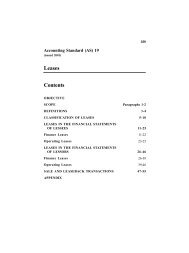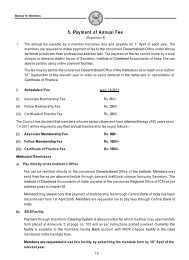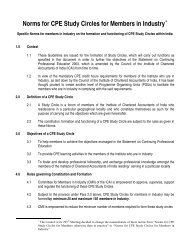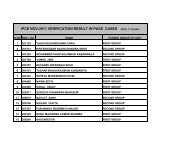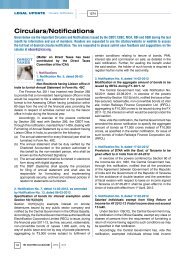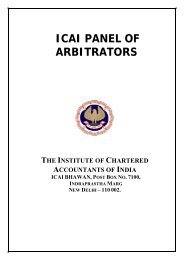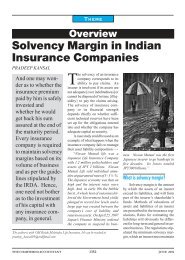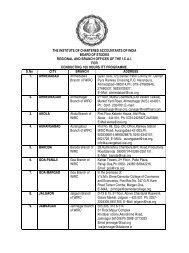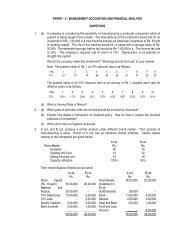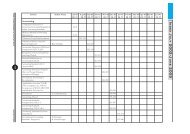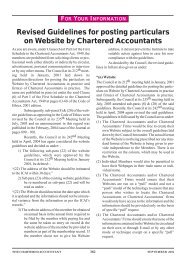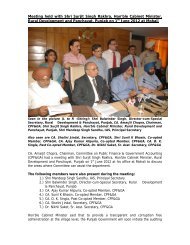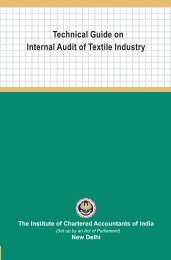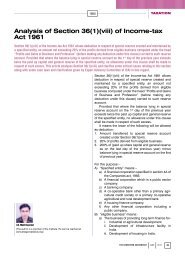The Chartered Accountant
The Chartered Accountant
The Chartered Accountant
You also want an ePaper? Increase the reach of your titles
YUMPU automatically turns print PDFs into web optimized ePapers that Google loves.
first balance-sheet made out after the issue<br />
of the said notification.<br />
Explanation 2.-In this paragraph, unless<br />
the context otherwise requires, the expressions<br />
"rate of exchange", "foreign currency"<br />
and "Indian currency" shall have the meanings<br />
respectively assigned to them under subsection<br />
(1) of section 43A of the Income-tax<br />
Act, 1961 (43 of 1961), and Explanation 2<br />
and Explanation 3 of the said sub-section<br />
shall, as far as may be, apply in relation to the<br />
said paragraph as they apply to the said subsection<br />
(1)”<br />
DECEMBER 2008 960 THE CHARTERED ACCOUNTANT<br />
ACCOUNTING<br />
ICAI has, considering the fact that there was a difference in the treatment/<br />
recognition of exchange differences on imported fixed assets as provided in<br />
Schedule VI and as provided in AS 11 (2003), stated that, pending amendment<br />
to Schedule VI by the Central Government, any company adopting the<br />
treatment as provided in Schedule VI will still be considered to be complying<br />
with AS 11 (2003) for the purpose of section 211 of the Act. Accordingly,<br />
the auditor of the company should not qualify his report in this regard under<br />
section 227(2) of the Act. <strong>The</strong> Central Government has vide the Rules stated<br />
that the accounting treatment for exchange difference in respect of imported<br />
fixed assets contained in Schedule VI to the Act should not be followed.<br />
Thus the said instruction states that any change, on<br />
account of change in rate of exchange (herein after<br />
referred to as “exchange difference”), in the liability<br />
of the company for making payment towards the cost<br />
of the fixed asset acquired from outside India (herein<br />
after referred to as “imported fixed assets”) or for<br />
repayment of moneys borrowed in any foreign currency<br />
specifically for the purpose of acquiring such assets,<br />
shall be added to or, as the case may be, deducted from<br />
the cost of such fixed asset (herein after referred to<br />
as “accounting treatment of exchange difference<br />
in respect of imported fixed assets”).<br />
<strong>The</strong> ICAI had provided for a similar accounting treatment<br />
in AS 11- ‘<strong>The</strong> Effects of Changes in Foreign Exchange<br />
Rates’ which was originally introduced in 1994<br />
Subsequently, ICAI revised AS 11 in March 2003. <strong>The</strong><br />
revised AS 11 (2003), did not require the adjustment<br />
of exchange differences in the carrying amount of the<br />
fixed assets, in the situations envisaged in Schedule VI<br />
referred to herein above. As per revised AS 11 (2003),<br />
such exchange differences are required to be recognised<br />
in the statement of profit and loss since it is felt<br />
that this treatment is conceptually preferable to that<br />
required in Schedule VI and is in consonance with the<br />
international position in this regard.<br />
However, ICAI had vide an Announcement published<br />
in ‘<strong>The</strong> <strong>Chartered</strong> <strong>Accountant</strong>’, November 2003, page<br />
497 stated as under:<br />
“It may be mentioned that the Institute has decided to<br />
take up this aspect with the Government to consider<br />
the same in the revision of Schedule VI to the Companies<br />
Act, 1956. It may be noted that where requirement<br />
of an accounting standard is different from the<br />
applicable law, the law prevails. Accordingly, a requirement<br />
of an accounting standard is not applicable to<br />
the extent it is in conflict with the requirement of the<br />
relevant law. Thus, pending the amendment, if any, to<br />
Schedule VI to the Companies Act, 1956, in respect<br />
of the matter, a company adopting the treatment described<br />
in paragraph 2 above will still be considered to<br />
be complying with AS 11 for the purposes of section<br />
211 of Act. Accordingly, the auditor of the company<br />
should not assert non-compliance with AS 11 (2003)<br />
under section 227 (3) (d) of the Act in such a case and<br />
should not qualify his report in this regard on the true<br />
and fair view of the state of the company's affairs and<br />
profit or loss of the company under section 227(2) of<br />
the Act.”<br />
Thus the ICAI has, considering the fact that there was<br />
a difference in the treatment/recognition of exchange<br />
differences on imported fixed assets as provided in<br />
Schedule VI and as provided in AS 11 (2003), stated<br />
that, pending amendment to Schedule VI by the Central<br />
Government, any company adopting the treatment<br />
as provided in Schedule VI will still be considered to<br />
be complying with AS 11 (2003) for the purpose of<br />
section 211 of the Act. Accordingly, the auditor of the<br />
company should not qualify his report in this regard<br />
under section 227(2) of the Act.<br />
Later, the Central Government notified Companies<br />
(Accounting Standards) Rules, 2006 (herein after<br />
referred to as “the Rules”) vide Notification dated<br />
7th December, 2006 whereby the Central Govern-



